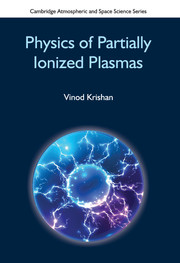Book contents
- Frontmatter
- Dedication
- Contents
- Figures
- Preface
- 1 Partially Ionized Plasmas Here and Everywhere
- 2 Multiflkuid Description of Partially Ionized Plasmas
- 3 Equilibrium of Partially Ionized Plasmas
- 4 Waves in Partially Ionized Plasmas
- 5 Advanced Topics in Partially Ionized Plasmas
- 6 Research Problems in Partially Ionized Plasmas
- Supplementary Matter
- Index
Preface
Published online by Cambridge University Press: 13 September 2017
- Frontmatter
- Dedication
- Contents
- Figures
- Preface
- 1 Partially Ionized Plasmas Here and Everywhere
- 2 Multiflkuid Description of Partially Ionized Plasmas
- 3 Equilibrium of Partially Ionized Plasmas
- 4 Waves in Partially Ionized Plasmas
- 5 Advanced Topics in Partially Ionized Plasmas
- 6 Research Problems in Partially Ionized Plasmas
- Supplementary Matter
- Index
Summary
Retirement is a time to indulge oneself, determine your own deadlines and to meet them at your own pace. The cooking breaks are no brakes! This is how I came to write this book, my second, after my superannuation; the first one is called Plasmas; The First State of Matter.
I was introduced to the topic of partially ionized plasmas by Professor Kumar Chitre who handed me the A. Brandenburg and E. G. Zweibel paper (1995, Ap. J., 448, 734) during my visit to the Tata Institute of Fundamental Research sometime in the year 2000. This resulted in our paper ‘Ambipolar diffusion in the solar atmosphere’.
Partially ionized plasmas again came into my line of sight in the year 2005 when I visited the University of Tokyo campus near Edogawadai to work with Professor Yoshida-sansei. Since then, I have been studying plasma-typical problems in partially ionized plasmas. Around the same time I was also collaborating with Professor Swadesh Mahajan on the role of the Hall effect in diverse circumstances. It turned out that in the weakly ionized plasma model of a partially ionized plasma, the ion inertial scale, a hallmark of the Hall effect, gets multiplied by the inverse of the ionization fraction. As a result, the effective ion inertial scale acquires a much larger value than its counterpart in a fully ionized plasma. This was reported in “Equilibrium structures in partially ionized rotating plasmas within Hall magnetohydrodynamics”. During my visit to Professor S. Masuda's group in Nagoya University, Professor K. Shibata and I discussed the possibility of observing this new inertial scale phenomena on the solar atmosphere with a future solar mission. Additionally, during my visits to the Kyoto University and the National Astronomical Observatory of Japan, Mitaka, Tokyo, I had discussions on the mean field dynamo in partially ionized plasmas with Professor S. Tsuneta's group. The highly positive response from my peers galvanized me into pursuing the area further, and my own desire to present partially ionized plasmas as a subject in its own right resulted in this book.
- Type
- Chapter
- Information
- Physics of Partially Ionized Plasmas , pp. xiii - xivPublisher: Cambridge University PressPrint publication year: 2016

